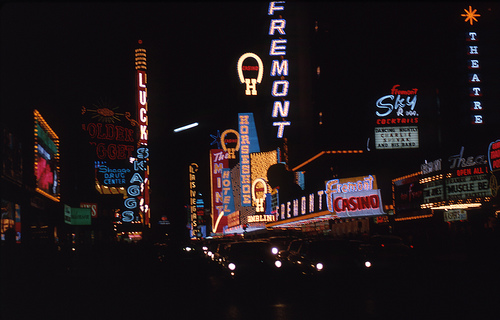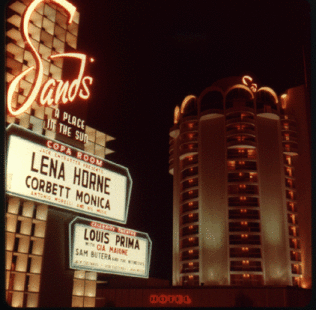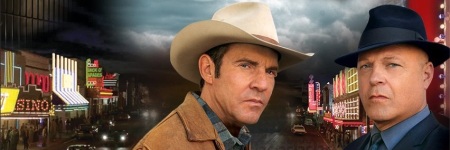The 1960s, the mob, Las Vegas. It is an era burned into our collective memory. The Sands, the Stardust, the Dunes, the Desert Inn all classic hotel/casinos that were in their prime and are now gone from the landscape of current day Las Vegas.
When we think of that era we remember the neon, the showrooms, the entertainers and the headlines.
And at the heart of the era is Ralph Lamb, the mythic sheriff whose job it was to hold the line between good and bad, during an era when the bad guys had charming public personas and were considered philanthropic residents who helped to build schools, hospitals and shopping malls that all helped improve the daily lives of the greater good. When I did those 130 video oral histories, it seems like almost everyone I spoke to not only knew Ralph but had a story about him. He was woven tightly into the fabric of the town and back then, even if you didn't know Ralph, you knew of him.
Today, many look back on that era and wish that the mob still ran the town. In today's corporate driven Las Vegas, many yearn for that era of cheap drinks, comped shows and less crime as if the mob was responsible for a lower crime rate.

In reality, much of it is nostaglic yearning for an era that has passed, for the small town/city that Las Vegas once was as if somehow a magic wand could be waved and that million plus residents that have moved here in the last twenty-five years could just vanish and those beautiful hotels and glowing neon signs could be returned to their rightful places of honor.
But if you ask those residents who lived through the twenty years that mob was a potent adversary, who they remember most, they will likely say Ralph Lamb, the cowboy sheriff who hailed from Alamo and was responsible for keeping the peace. He had grown up in Alamo but his father's death at a rodeo in 1938 changed things. He and his sister Wanda went to live with his older brother Floyd, who had a ranch. During World War II, Ralph worked in Army Intelligence. He hoped to become a G-man after the war but was needed to help sustain the family so his dreams of college were put on hold and he returned to Nevada. He became a deputy sheriff in Las Vegas. Before long, he was the Chief of Detectives.
For awhile, he left the force and started his own detective agency where Howard Hughes, a frequent visitor to the oasis in the desert, was his best customer.
He ran for sheriff in 1958 against the incumbent, Butch Leypoldt and lost. But that didn't deter him. He came back in 1961 when Leypoldt left the job to take a position on the Gaming Control Board. In 1962, Ralph won election to a full term and held the job for the next 18 years.
He began modernizing the department and made his business to know who was running what on the Strip and on Fremont Street. He took the job seriously and made it clear that business as usual was over.

Like a mythic hero out of a western, Ralph captured the imagination of newsmen looking for stories as well as the townfolks who lived in a town that had been founded in the very waning days of the closing of the western frontier and still marketed the town as if it was still a frontier paradise, the Old West in Modern Splendor.
The city's fathers capitalized on that slogan and in many ways, Las Vegas still felt like a small western city. Every May we celebrated our western roots with the month long Helldorado celebration including parades, rodeos and western wear.
The Lamb family embodied that western creed that Las Vegas liked to think we lived by and of all the brothers (Floyd, Darwin, Ralph among a family of 11) involved in civic duties and politics, it was Ralph Lamb that Las Vegans looked to keep our streets and us safe from harm. He was shot at but never shot anyone in all his years as sheriff.
His showdown with Frank "Lefty" Rosenthal is legendary among old-timers. He also wasn't afraid to tangle with Moe Dalitz, Benny Binion and other owners and remind them that he was the law in Las Vegas.
Years ago, Sam Peckinpah wanted to tell Ralph's story. For the last ten years or so, Nick Pileggi has been trying to bring Ralph's story to the screen. Back in the mid-2000s, I heard that it would be a feature film starring Russell Crowe and that Clint Eastwood was interested in directing the film.
Then the economy tanked and the script went into turn around. Peliggi took the idea and re-imagined it as a television series. Which might actually be a better platform for not only telling Ralph's story but the story of Las Vegas in that mythic era.
This fall, Vegas, (not the old Robert Urich series) debuts on Tuesday nights on CBS. The show stars Dennis Quaid as Ralph and Michael Chiklis as Johnny Savino ( a combination, no doubt, of several real-life characters), the mobster that Ralph goes up against. Carrie Ann Moss and Jason O'Mara co-star.

It should be interesting to watch. Back in the mid-1980s when Crime Story was shooting, many of the classic hotels were still standing and Fremont Street still looked much as it did twenty years earlier.
Today, the showrunner and crew of Vegas have a harder job. They have to recreate that era from scratch. CBS seems quite supportive of the show so here's hoping they have the budget and the research they need. But it's more than just recreating long-gone hotels and facades, it's getting right the feel of the town that Las Vegas was. There was much to love (and to depict) about that town back then that goes beyond just the normal checklist.
It's a big story to tell but one worth telling and worth telling with more than a nod to the way it really happened. John Ford liked to say "when fact becomes legend, print the legend".
Here's hoping that those behind Vegas mix the facts in with the legends they will no doubtedly tell.
Here's a video of Dennis Quaid and Michael Chiklis talking about the show: